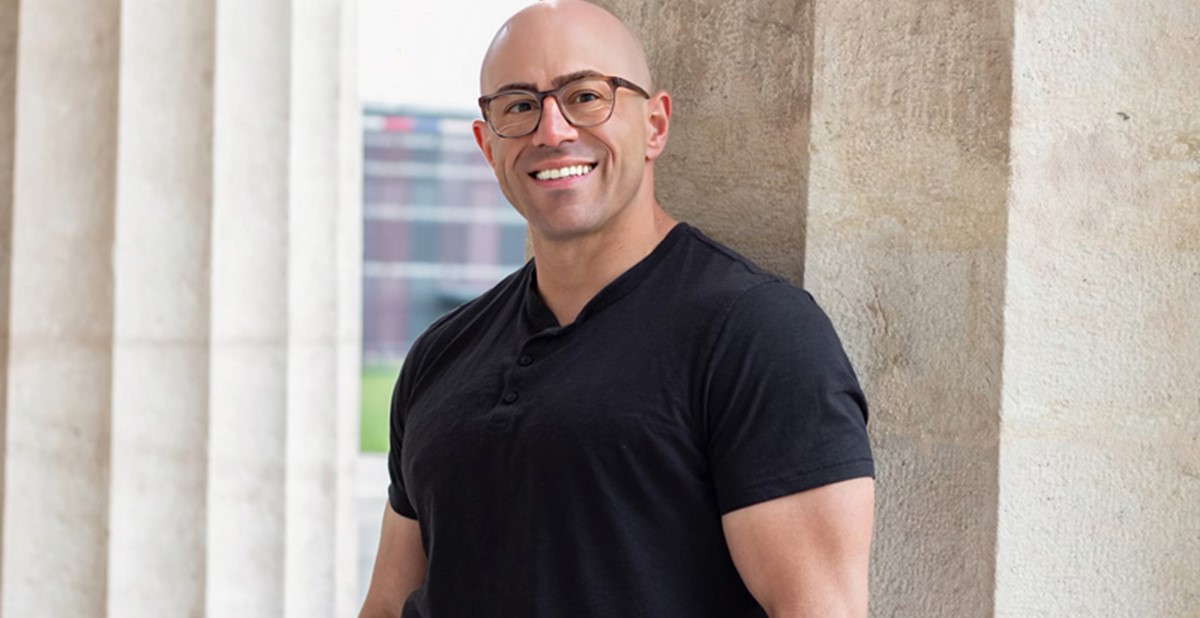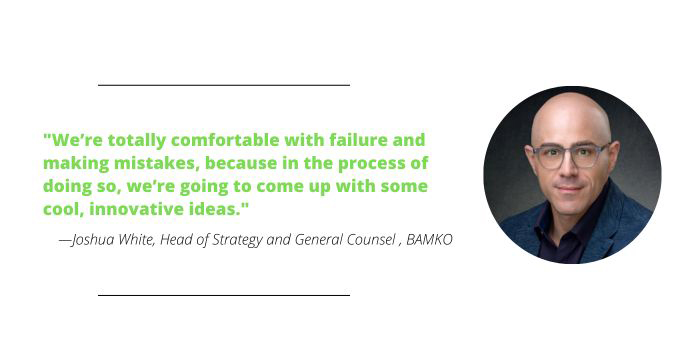The Thoughtful Contrarian

Joshua White, halfway through his first year on the PPAI Board of Directors, has earned a reputation as somewhat of an iconoclast. White, head of strategy and general counsel at Los Angeles-based distributor BAMKO, was elected to the board last year and took his seat in January following The PPAI Expo 2023. Since then, he’s sought to further the conversation and push it in new directions for the betterment of the Association and the industry.
White’s career started in law. After graduating from the UCLA School of Law, he hung his shingle in Santa Monica and set out to land clients. One of his first was a small (at the time), local promotional products distributor called BAMKO. That relationship grew over a few years, and in 2013, he came on as in-house general counsel. It’s a role that has expanded to encompass several responsibilities, including his current focus on the organization’s business strategy.
Recently, White sat down with PPAI Media to share his story and discuss BAMKO’s business culture and how it has impacted the company’s success, as well as his observations on the industry, PPAI and his experience on the Association’s board.
PPAI Media: BAMKO is a successful company in our industry, and you’ve highlighted the culture cultivated by company leadership. Can you tell me more about that?
White: Business is philosophy and people. If you communicate with clarity what you believe, and if you hire and empower the kind of people who are aligned with that, you create a great company. The numbers, the results, the clients – all that stuff are outcomes. It’s the inputs that matter. The input for us is clarity around what we believe and living in accordance with those values. We are very passionate about that.
And if you create a powerful culture that everyone understands and knows and has bought into, people start making those choices themselves without ever having to be encouraged to do so. It becomes its own self-propelling thing.
I think we probably talk about culture so much because we think that the type of company we are is basically downstream from philosophy. Everything flows from there. There is very little separation between the personal and professional, and it’s one of the reasons people, in my experience, are really happy here.
We believe human flourishing transfers across realms. If you succeed in a thing that is expressly contained to your personal life, a hundred times out of a hundred, that shows up at work. Better people make better employees.
PPAI Media: How has BAMKO’s culture and philosophy been a factor in the business’s success?
White: We looked at the industry and recognized that there were opportunities to do things better and smarter and more efficiently. And we’ve evolved through a series of trial-and-error experiments to who we are today.
Our philosophy has been, if everyone else is doing it this way, we’re going to go the other way and see if it’s better. Sometimes it works, and sometimes it doesn’t, but that approach has always been at our core.
We’re totally comfortable with failure and making mistakes, because in the process of doing so, we’re going to come up with some cool, innovative ideas. Not being limited by a fear of failure has allowed us to be flexible and agile and open-minded when it comes to experimentation. We’re willing to be bad at things in order to get good at them. It’s a huge part of our success.
You saw that core ethos of agility and entrepreneurialism during the pandemic. BAMKO got onto a lot of people’s radars when we went from, I believe, $108.6 million in revenue in 2019 to $202.2 million in revenue in 2020, and in a year when most people’s sales contracted by 30%. We found opportunities that were buried inside of the adversity. That was partially because of our sourcing capabilities, but we would have never created those opportunities without that ethos that allowed us to quickly expand in new and different ways.

PPAI Media: How has your experience with BAMKO and its culture affected your experience on the PPAI Board of Directors? You’re about halfway through the first year of your term. How’s it going?
White: At one of our board meetings, I believe it was Chris Anderson [HPG CEO and PPAI board member], who described me as a thoughtful contrarian. There was unanimous consent to that. And I was charmed and flattered by that description, particularly the thoughtful part.
I will never be the establishment, status quo guy. I think one of the reasons I was selected to be on the board was to tactfully and diplomatically present alternative viewpoints and, more importantly, ask incisive, insightful questions.
It is more important that I challenge people to be more expansive and nonlinear in their thinking than it is for me to argue any one point. There’s so much experience and insight and wisdom in that room that it would be arrogant for me to think that very often I have the most important or interesting thing to say.
I look at it as the best thing I can do is ask good questions that frame our responsibility and our options in ways that people are not thinking of. Very rarely am I trying to be prescriptive in dictating what I think should happen. I just want to facilitate the conversation and allow the collective wisdom to take hold.
From a membership point of view, this approach helps ensure a more diverse set of perspectives and viewpoints are represented in the room. Even though we have a diverse selection of board members, if you’re not asking a diverse array of questions, there are people out there whose perspectives are not being represented.
PPAI Media: A few years from now, when your board term is behind you, what would you like your legacy as part of the Association’s leadership to be?
White: First and most important is that the people that I have the pleasure of working with say, “He was a really good teammate.” It’s always been my desire at BAMKO and anywhere I’ve worked for people to look at the way that I have supported and worked with them and contributed, and say, “Man, Josh is one hell of a teammate.”
It’s what a great teammate does: Support and elevate the people around you in a way that helps them get better. That would be great.
I think the idea of being a thoughtful contrarian and being an advocate for a unique perspective in this industry would be part of it. And being someone that helped the board to be expansive in its thinking and its perspectives.
PPAI Media: What do you see as the future of the promo industry? Where is it going?
White: Where I’d love to see the industry go is twofold. One, I think there’s a huge opportunity and, frankly, necessity for us to continue down the path of technological adoption and digital transformation.
I think the future of this industry is necessarily far more tech-enabled than it is today, and the more vociferously and quickly that we can give people the tools, resources and knowledge to accelerate the process of tech adoption, the stronger we are. I believe that as strongly as I believe anything.
That’s one. I am also passionate about the elevation of the conversation around promotional products. We don’t, as an industry, generally do a good enough job talking about what the products we sell accomplish. We need to do a more effective job of talking about the why of why people buy and use promotional products. I think that’s an empowering and impactful story.
We are in the advertising business, ultimately. People give away branded merchandise for a reason. As an industry, we have an incredible opportunity to talk about the value and power of the things that we sell and what they’re capable of doing.
We can also improve both the perception and quality of promotional products. There’s a lot of energy around sustainability, and I think that’s great. The less waste we create and the more precise we can be and produce things of higher value that people actually want, the higher perception of value this industry is going to have.
Elevation is a key component of my vision for what is capable here, for what is possible here. And if I can contribute to that in any way, whether it’s on the board, as a public advocate or as a spokesperson, I’d love to elevate this industry.
Khattak is the deputy editor at PPAI.

